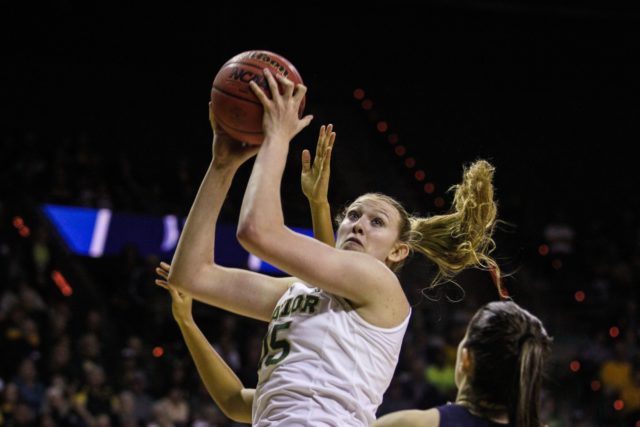By Elisabeth Tharp | Broadcast Reporter
Flower Mound sophomore Lauren Cox is one of the Baylor women’s basketball team’s most valuable players. This season, she secured her second individual award from the Big 12 conference, after receiving the Big 12 Sixth Man Award as a freshman and Defensive Player of the Year honor this season.
What many people might not know about Cox, however, is that she was diagnosed with Type 1 diabetes in second grade, when she was just seven years old.
“I was really young, so I didn’t know what was going on, but I’ve learned a lot about it. I’m an expert now,” Cox said.
Cox said coping with diabetes was hard and embarrassing because she didn’t want people staring at her when she would take a shot or check her blood sugar.
“When I got to Baylor, coach Mulkey was the one who kind of put it out there,” Cox said. “She told me to be a role model for younger kids who have diabetes.”
In becoming a role model for younger kids with diabetes, Cox said she loved being able to put a smile on their faces.
“Showing I can do anything despite diabetes, and that’s what I want to show the younger kids that I get to meet. They can do anything they want to do, whether they have a doctor in their ear telling them they can’t do this and they can’t do that. I want to be that person to show them that they can,” Cox said.
Cox said she tells those with diabetes that they should accept it as a part of their lives.
“There is no cure for it right now. Hopefully, in the future, there might be. But don’t be embarrassed by it,” Cox said. “You can’t let it define you. You have to control it.”
Cox said she wants people to know that Type 1 diabetes is different than Type 2.
According to Webb.com, if someone has type 1 diabetes, their body’s immune system destroys the cells that release insulin, eventually eliminating insulin production from the body. Without insulin, cells cannot absorb sugar, or glucose, which is necessary for producing energy. People can be born with type 1 diabetes, but for many, it develops in early childhood.
According to Webmd, Type 2 diabetes hinders the body from using insulin the correct way. This is called insulin resistance. As Type 2 diabetes worsens, the pancreas makes less and less insulin. Type 2 can occur at any age but commonly becomes apparent in adulthood.
“People should know that it’s not going to hold me back. It shouldn’t hold anyone else back from doing what they want to do,” Cox said with a smile.
Along with Mulkey, Cox’s friends and family have been extremely supportive of her journey. Cox said the hardest part about leaving for college was leaving her family.
“My parents had always helped me through high school and everything. Even though I knew how to take care of it, they were there to help me if I needed it,” Cox said.
In the press conference at the end of the second round of the NCAAW Tournament, head coach Mulkey spoke highly of Cox. Mulkey said Cox is in the best shape of her life and that her diabetes is under control.
“All the things that a normal student would have to deal with as a freshman, add a little bit to Cox’s plate. But, when you do all the things you’re supposed to do and you feel good, you play good,” Mulkey said. “If you don’t understand basketball, then you don’t understand what she brings to our team. If you understand the game, then you understand her value because she understands what a coach is looking for.”




